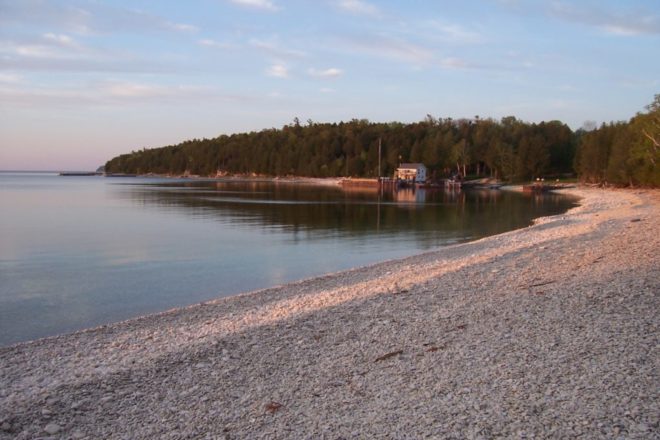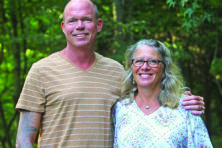Anonymous Objections Stalling Land-Conservation Projects
- Share
- Tweet
- Pin
- Share

Door County Land Trust alters its land-conservation strategy to avoid project delays
Plus: Read Dee J. Hall’s column on this topic here>>
“Water quality is declining; forest cover is disappearing; fisheries are less viable; and wildlife is struggling to find habitat – and the funding set aside to address these issues is unspent.”
— Emily Wood, Executive Director, Door County Land Trust
The Door County Land Trust has begun limiting the amount of money it requests for land purchases because of what its leaders see as a “procedural flaw” in the state’s legislative system.
Door County Land Trust leaders often would like to ask for more than $250,000 in Knowles-Nelson Stewardship Funds (KNSF) to purchase and protect lands as natural resources and for public use, but they are seeing roadblocks. They have contacted the area’s representative and senator and the governor’s office seeking change, asserting that the Joint Committee on Finance is consistently holding up Wisconsin’s land-protection funding.
“The Knowles-Nelson Stewardship Fund is the top source of state funding for conserving Wisconsin’s lands, waters, wildlife and communities – but the system is not perfect,” said Emily Wood, Door County Land Trust’s executive director. “Lawmakers who make up the committee currently hold the right to object to an application that is requesting $250,000 or more from KNSF and can do so anonymously and without needing to explain the reasoning behind the objection. These objections can hold up an application and its related conservation projects indefinitely.”
State Rep. Joel Kitchens (R-Sturgeon Bay), who represents Door County and serves as vice chair of the Environment Committee, said he does not know whether it’s truly a “rule” that a single Joint Finance Committee member can block Knowles-Nelson funding for a particular project. He said it’s more of a procedural tradition, but what bothers him most is that any one member of the committee can anonymously block a land-protection effort.
Because that continues to happen, the Door County Land Trust has stopped asking for grant requests that are greater than $249,999.99 to avoid having its projects held up.
“While many of our projects are still receiving funding, a large portion of the project costs must be covered by other grant sources, or donations from private individuals,” Wood said. “These additional funding obstacles require substantially more staff time and private donor support to close a deal, making it harder for us to do our work efficiently.
“This is a concern because there are conservation projects across the state that are being delayed at a time when conservation is most critical. The result has a domino effect across Wisconsin. Water quality is declining; forest cover is disappearing; fisheries are less viable; and wildlife is struggling to find habitat – and the funding set aside to address these issues is unspent,” Wood said.
The Land Trust is working with many conservation partners to raise awareness of this issue and asking legislators to require the committee to hold public hearings and to publicly air objections and final votes on projects.
Pebble Beach Is a Local Example
“One person can block anything,” Kitchens said. “The part I don’t like about it is they can do it anonymously. It’s not a law. It’s just the way it’s been done.”
Kitchens, who doesn’t serve on the Joint Finance Committee, said that when the Village of Sister Bay supported a request for about $800,000 in funds to acquire Pebble Beach, he had to do some sleuthing to figure out who on the committee was standing against the release of funds.
“It took effort to find out who the people were who were blocking it, and we worked a compromise to get it done,” Kitchens said, referring to the eventual $392,000 grant the committee allowed.
In the case of the Pebble Beach project, Kitchens said committee members were surprised that residents of Sister Bay would want to see high-value shoreline properties taken off the tax rolls. He said many legislators serve in districts such as the Northwoods, where Knowles-Nelson funds are less popular because residents there oppose taking land out of the tax base. Kitchen proved to committee members that Sister Bay residents had filed no objections and had, instead, shown support.
Not Everyone Favors Land Conservation
Mike Carlson, executive director of Gathering Waters: Wisconsin Alliance for Land Trusts, is dealing with an anonymous objector who has blocked Knowles-Nelson funding for conservation easements at the headwaters of the Wisconsin and Wolf rivers.
He said more people need to know about the overall issue and the pushback against the use of land-protection funds to protect land. Carlson warned that groups are pushing against conservation easements – even though those do not remove land from property-tax rolls.
“There’s even a resolution to limit conservation easements in northern Wisconsin that has been circulated to every town government in Oneida County,” he said.

